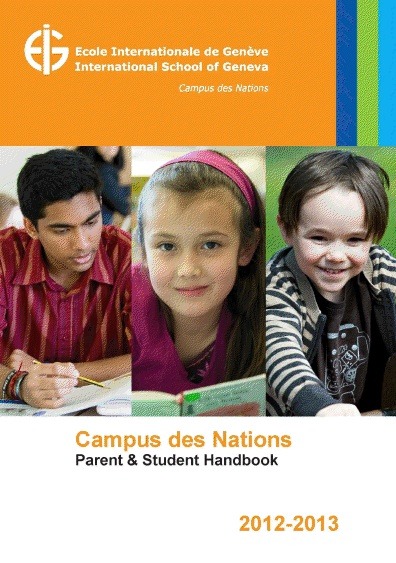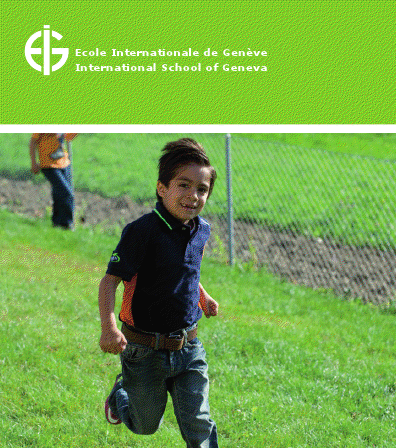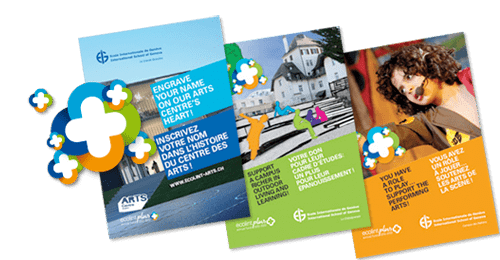

ECOLINT – CAMPUS DES NATIONS
Dr Conrad Hughes. The Director of Education in the International School of Geneva (ISG) :
“We strive to provide a distinctive high quality international education through which all our stdudents are helped to develop their abilities to the highest level of their potential. We respect students’ individual and cultural identities, encouraging them to become independent learners, eager to carry on learning throughout their lives” (ISG 2012)
We had the pleasure of interviewing Dr. Conrad Hughes, Director of Education at the International School of Geneva. Dr. Hughes told us about the characteristics of the educational system in ISG with its wide range of social and cultural diversity as well as the challenge it faces in the era of globalization: how to prepare students to integrate and succeed in a booming economy, and to build cultural and social awareness of the importance of their participation in the construction of the world of tomorrow.
What were the circumstances behind the creation of (ISG) in 1924?
It was created for peace. In 1924, the League of Nations and a group of educators came together to create an international school for the children of civil servants working for the League of Nations. Initially, it was called the League School. The educators were versed in the theories of the new education fellowship (l’école nouvelle), adapted by l’Institut Rousseau and also had some members deeply anchored in the Montessori method and influenced by the theories of Freinet, Froebel, Dewey, Ferrière and Claparède. This educational method, born in the eighteenth century with Rousseau, promotes the principle of individuals actively participating in their own education by putting students at the centre of enquiry-based learning. It is still the basis of our education system today.
One of the founders was Ludwik Rajchman, an important figure in the history of internationalism who also founded Unicef. There was also a remarkable American diplomat called Arthur Sweetser who went on to open the United Nations International School in New York.
The circumstances behind the opening of the International School of Geneva were the same as those behind the creation of the League of Nations – wanting to make a better world, a more peaceful world.

What are the profiles of students who attend ISG ?
We have over 130 different nationalities now. In the last survey we did in 2011, there were 125 different nationalities and over 80 different mother tongues represented among the student population. There are over 4300 students ranging from age three (reception class) up to eighteen (the last year of the maturité). So, we have students with many diverse origins.
How do you deal with the challenge of integrating students who are socially and culturally diverse ?
The challenge of the internationally-minded educational enterprise is to make sure that young people going out into the world are willing to make it a better place for all regardless of race, creed, gender or language
Dr Conrad Hughes
Our mission is to really encourage important international values by including them in the curriculum and showing respect for integration with other countries and the host country, Switzerland. We keep in mind the principles of mutual respect, interest in other people and non-violence. We also, of course, subscribe to the United Nations Charter of Human Rights that has governed our relationship with the United Nations since our inception. In addition, we value the qualities demanded of students by the International Baccalaureate (IB): things like being respectful, open minded, caring, reflective, enquiring, principled and balanced. These are essentially the constituents of international education.
Now the complicating factor when you have so many different nationalities is, of course, the languages. We are bilingual and in some of our schools 50% of the curriculum is in French. For example, in La Chataigneraie primary school all the pupils in year 5 have 50% of their lessons in French. This theory of linguistic development is called the EMILE system (études de la matière integrée à la langue étrangère) or in English, CLIL (Content and Language Integrated Learning).
We have francophone and anglophone pupils and also receive children from many different backgrounds. So, we have language and learning support to help students integrate into the curriculum as successfully as possible.
We also mark many festivals linked with the cultures and the religions of the pupils – on one of our campuses, for instance, we celebrate Christmas, Diwali and Saint Lucy’s Day in the ‘Festival of Lights’.
Are your classes streamed according to ability ?

Essentially, our philosophy is about inclusion and having mixed ability classes. We don’t believe in streaming or classifying students according to their abilities, except in some cases and at a certain level, such as for languages in the Secondary school. On this campus, from year seven up to year ten, students are put into either an intermediate or advanced group for French and English. During the last two years of schooling for the IB, we help students to choose either a higher or extended option. Our philosopy is that a diverse class environment is the most beneficial because schools are not only about intellectual development, but also for socialising students.
We are not just teaching the curriculum, we are teaching the students. You have to adapt your teaching style to the different learning styles of the students. In some schools, teachers stand and talk while the students write notes for hours and hours. This is not teaching, it is more like broadcasting information and is not what we believe pedagogy is all about. We use methods to meet our vision, to let each student fulfil his or her potential and because we do this, separating students by ability is less necessary.
Are there any strategies for students who have learning difficulties? Are there special classes for them?
Each school has a learning support department. These are run by specialists in metacognition and they are there to ensure the best possible learning. On some of our sites, we also run extended support programmes for students with severe learning needs.
Article 4 of the ISG Charter insists on «basic teaching being given in English and French, and possibly in other languages». What are these other languages ?
Middle school students, aged 11 to 15, take three languages as part of their education: English, French and either Italian, German, Spanish, Chinese or their mother tongue. Our student population speaks over 80 mother tongues and therefore, part of our mission is to give students the opportunity to continue studying their mother tongues as far as possible. To this end, the school employs mother tongue coordinators whose role is to coordinate these study programes. We facilitate these learning environments. We believe that language is crucial for learning when you live in a multilingual country like Switzerland. It is crucial to teach many languages to the students, as it develops their common underlying proficency.
Who contributes to the development of the curriculum of the department ?
In each school, the principal has a curriculum coordinator. These are specialists who work to develop the curriculum with the teachers within their own guidelines, while also respecting the frameworks provided by the curriculum boards we are part of – the IB (International Baccalaureate), the IGCSE (International General Certificate in Secondary Education) and so on.
ISG is associated with the spirit of Claparède, the founder of »l’école nouvelle et la pédagogie active » where active learning and diversity are very important for the students to flourish and succeed. Can you tell me about this ?

Learning is about cognition, activating prior knowledge, gaining new knowledge and developing skills and dispositions; it sits at the crossroads of social, psychological, cultural, linguistic, ethical, physical and spiritual paths. Learning through doing and constructing knowledge rather than appropriating it passively are important, but there is much more to an education!
Language study is fundamental to having access to the other disciplines you teach. What do you do to make students aware of the importance of languages ?
We do this by teaching using the EMILE/CLIL system. Remember that this is done in various ways and at a different frequency and amplitude according to the campus. In learning the subject, students can become aware of the importance of language as they develop concepts. When teachers teach pupils in a second language, they have to make sure they make themselves understood. By using the EMILE system, we show students the importance of language as a vehicle for learning. We also celebrate language together through different cultural activities (field trips, performances, special days and so on).
The international baccalaureate was established in the 1960s. How does it prepare the students for their future professional careers?
If you look at the job market today, people need technical skills, critical thinking, creativity, flexibility, adaptability and to be team players. These skills are all in the diploma program where pupils have to get involved with community service activities, learn new skills, think about their learning and learn how to construct knowledge. In the diploma, we are looking for the “base of the iceberg” – the skills and the attitudes beneath the results. Pupils have to do a first and second language, humanities and science, mathematics, not to mention the Theory of Knowledge and an Extended Essay. It is a holistic educational experience, not a narrow one. There is a philosophy behind the program. We want students to perform, to apply themselves and learn by themselves. We really encourage them to be independent to prepare them for university and beyond.
What are the new technologies that are used in ISG to transmit knowledge to the students ? Do these technologies change the fundamental role of the teacher ?

We use iPads, Chromebooks, interactive whiteboards, computer labs and online courses which we have on different platforms. We have ICT coordinators and we use diverse strategies to share our knowledge.
I don’t think that technology will be a complete substitute for the teacher, but it can make things more effective. Take mathematics as an example. Perhaps there is one teacher for twenty four students with that teacher trying to listen to each and every student and telling each one what the best way is for them to assimilate their knowledge.
If, on the other hand, each student has his or her own computer and he/she does an online course which adapts to the level and needs of the student, there will be a much greater degree of differentiation. They are all doing mathematics, but one student is doing statistics, another is starting to look at the arithmetic mean while a third is doing a t-test, a sort of multi-value system. The teacher is still needed though, to clarify concepts, to set creative open-ended problems and to ‘steer the ship’.
What about new projects in the International School of Geneva ?
One interesting new piece of information relates to the International Baccalaureate Career-related Certificate (IBCC). We will be the first school in the French part of Switzerland (Bassin Lémanique) and I think in Switzerland to offer this course. It is an IB course to get a professional vocational qualification so that pupils have direct access to the job market. We also plan, as part of this course, to introduce the BTEC which is a professional diploma course The question is how to prepare students for the outside world. We see now that students come out of university and can’t find a job. The world is changing and education has to prepare children earlier to make an impact so they can succeed in their future professional careers.
Hi Hadhemi. Great article providing interesting information about this important institution. I never realised that they actually have more than 80 languages there. It must be a very challenging environment to be in.